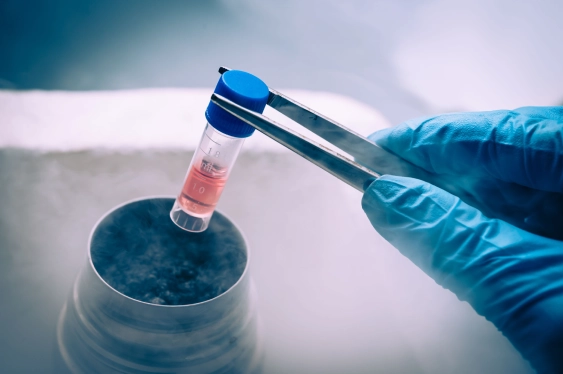About Freezing Embryo, Egg, Sperm
At Tathastu IVF, we use the latest technology and techniques to ensure the highest possible success rates for our patients undergoing cryopreservation. Our state-of-the-art laboratory facilities and experienced team of fertility specialists allow us to provide individualized care and support throughout the process. We understand that undergoing fertility treatment can be stressful and emotional. That’s why we offer a supportive, compassionate environment where patients can feel comfortable and confident throughout the process.
In this section, we’ll discuss the process of freezing embryos, eggs, and sperm, also known as cryopreservation.
Embryo Freezing:
- Embryo freezing is a process that allows couples to preserve embryos created during an IVF cycle for future use.
- After the embryos are created in the laboratory, they are frozen and stored in a special solution at very low temperatures.
- Embryo freezing can increase the chances of a successful pregnancy in the future by allowing couples to use their frozen embryos for a future IVF cycle, without the need for another egg retrieval procedure.
Egg Freezing:
- Egg freezing is a process that allows women to preserve their eggs for future use.
- Women may choose to freeze their eggs for a variety of reasons, including age-related fertility decline, medical treatments that may affect fertility, or personal circumstances.
- The eggs are retrieved from the ovaries and frozen using a special technique called vitrification, which allows them to be stored at very low temperatures.
- Egg freezing can provide women with a greater sense of control over their fertility and give them the option to pursue pregnancy at a later time.
Sperm Freezing:
- Sperm freezing is a process that allows men to preserve their sperm for future use.
- Men may choose to freeze their sperm for a variety of reasons, including medical treatments that may affect fertility, or personal circumstances.
- The sperm is collected and frozen using a special technique that allows it to be stored at very low temperatures.
- Sperm freezing can provide men with the option to use their frozen sperm for a future IVF cycle, without the need for another sperm collection procedure.
If you’re considering cryopreservation, we invite you to schedule a consultation with one of our fertility specialists to learn more about how our comprehensive approach to fertility treatment can help you achieve your dream of starting or growing your family.



